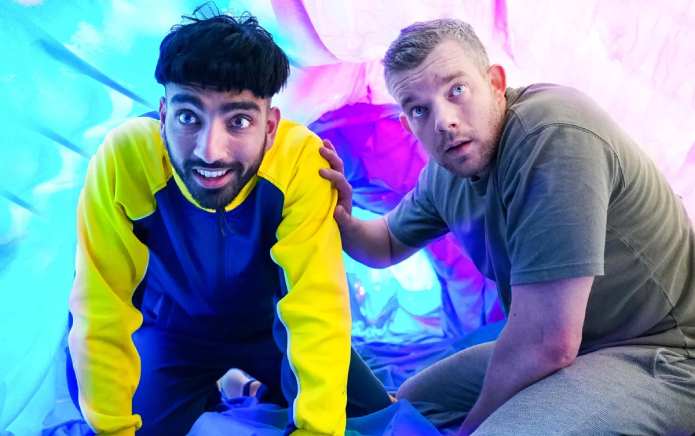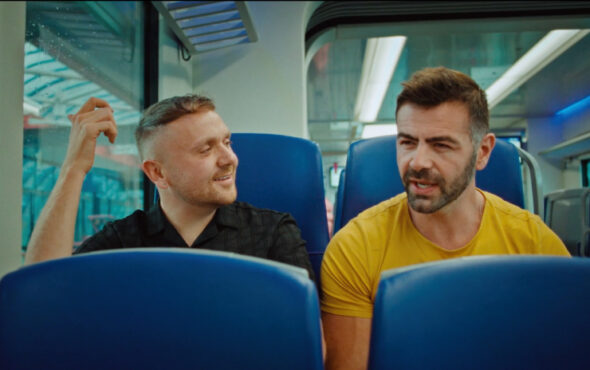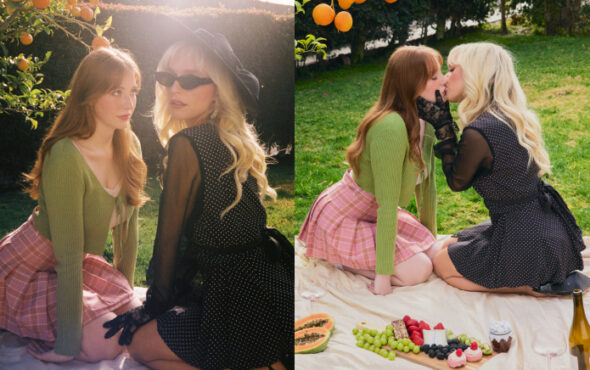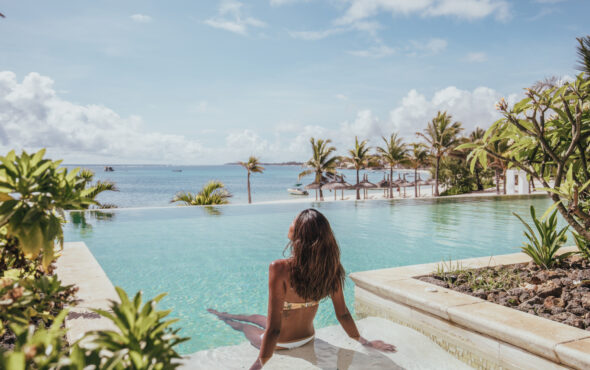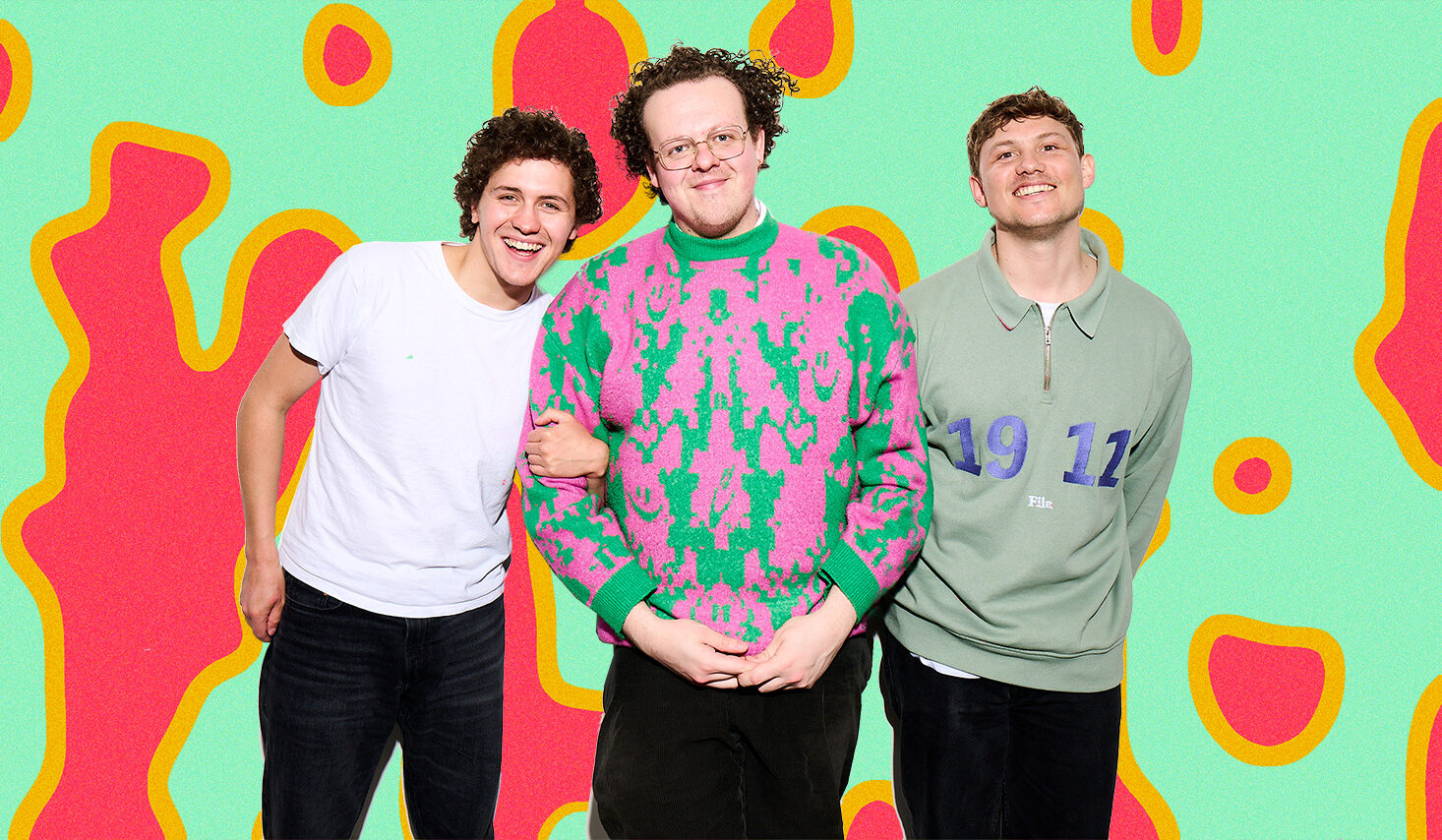
From the ice bucket challenge to the importance of chosen families, the second season of Big Boys has it covered. “It’s what you want from a second series,” star Jon Pointing tells GAY TIMES. “It’s got more of the same, all the characters and their storylines have been expanded and the gaps get filled in.” The acclaimed Channel 4 comedy is set to return 14 January, with creator Jack Rooke once again teaming up with Dylan Llewellyn and Pointing, his long-term friend, as unlikely gay-straight uni duo Jack and Danny.
The triumph of Rooke’s witty, millennial coming-of-age comedy is the nuanced exploration of sexuality, mental health and being a young working class man interwoven into a storyline about friendship, rather than the entire plot hooked on identity. “I don’t solely think of Big Boys as a gay comedy, but I think it is much bigger and much broader. But I also know that a lot of its roots and a lot of its support base is within my own community, so I am really chuffed for that,” Rooke explains.
Rooke, the writer, comic and IRL protagonist of Big Boys, raised his profile via memorable skits about the navigation of his life as a queer person, from Dawn of a New Gay to Happy Man. He finessed his ability to enmesh the heartwrenching with the heartwarming, as well as “how to layer jokes with true life stories”, during three years of performing at the Edinburgh Fringe festival: “My life has been having the incredibly painful next to the incredibly funny.”
The new season of Big Boys has a secondary function of being an ode to 2014. The “last good year for Britain, it was after the 2012 Olympics where we felt like we were the belle of the ball. It was just before Brexit before everything got a bit sour and divisive,” Rooke reflects. Same-sex marriage took place for the first time. “It got me going to more weddings than ever before, bloody annoyed about it,” he laughs.
Big Boys has been part of the new gen wave of programming that explores queerness in an educational setting (think Heartstopper, Sex Education and Saltburn). However, Rooke is quick to pick up on how “TV commissioners have been really wimpy” in producing projects that, for the most part, cast “very attractive, very cute and very Instagrammable [leads]”: “And that’s great but it still isn’t reflective or real as it could be. […] Big Boys is repairing a lot of lost representation over the last few years, but I still think there’s a long way to go”.
Here, Rooke and Pointing discuss the “role reversal” in character dynamics in season two, why Danny is the “most important character I might ever write,” and, after a decade of friendship, Rooke ponders: “10 years and he’s still never snogged me.”
What can you tell us about the new season of Big Boys and the trajectory of Jack and Danny’s characters?
Jack: It is a step up really. We were just chatting and it feels like maybe a slight role reversal at times, where in season one Danny was really looking after Jack and very protective of Jack and now it feels like Jack is looking out for Danny and trying to make sure he is okay and stays on a strong path, looking after himself. It is just the two of them really supporting each other.
Jon: It’s what you want from a second series. It’s got more of the same, all the characters and their storylines have been expanded and a lot of things that were alluded to in the first series, those gaps get filled in. More context for everyone.
Jack: More context. The episodes begin with Danny flashbacks rather than Jack flashbacks. You get a broader sense of Danny’s home life and what contributed to his mental health, where we meet him and the state he is in. It broadens out yours, Corinee’s [Izuka Hoyle], Yemi’s [Olisa Odele] and Cousin Shannon’s [Harriet Webb] stories and you get more depth into that cast.
This season is set in 2014. What were the most fun cultural moments to revisit from that time period?
Jack: Well, GAY TIMES, we got the first gay marriage in 2014! It got me going to more weddings than ever before… Bloody annoyed about it. [Laughs.]
Jon: 2014 was a huge year.
Jack: It was the last good year for Britain, it was after the 2012 Olympics where we felt like we were the belle of the ball. It was just before Brexit, before everything got a bit sour and divisive.
Jon: We both did our first Edinburgh’s [Fringe Festival].
Jack: We both did our first Edinburgh’s, yes we did. I think I met you in 2014, that was when I was doing that comedy poetry night.
Jon: At Scotty’s night?
Jack: Oh my gosh, it’s probably 10 years of our friendship in two months? Wow, 10 years!
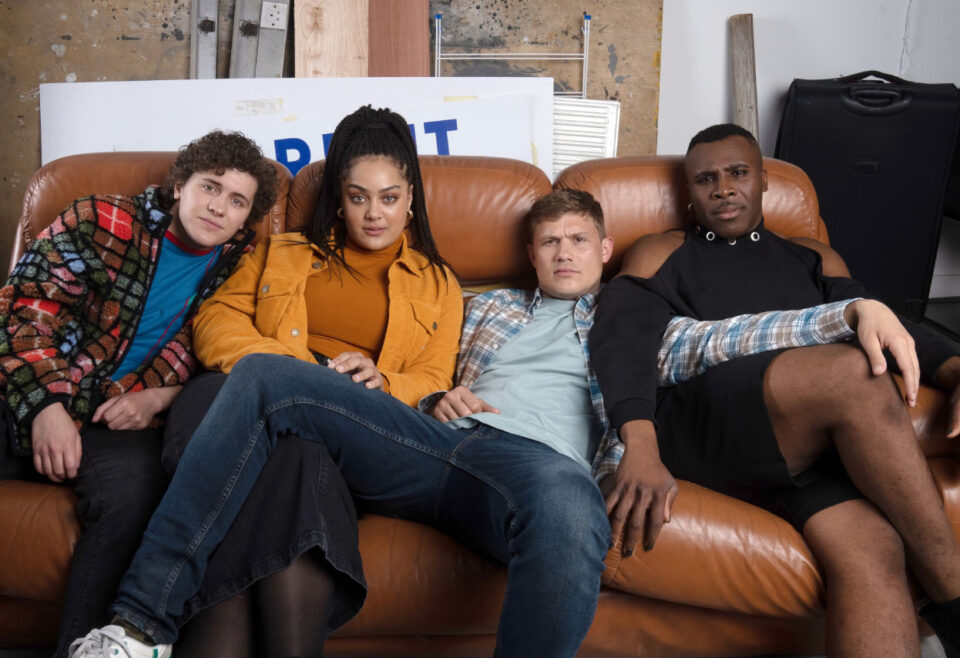
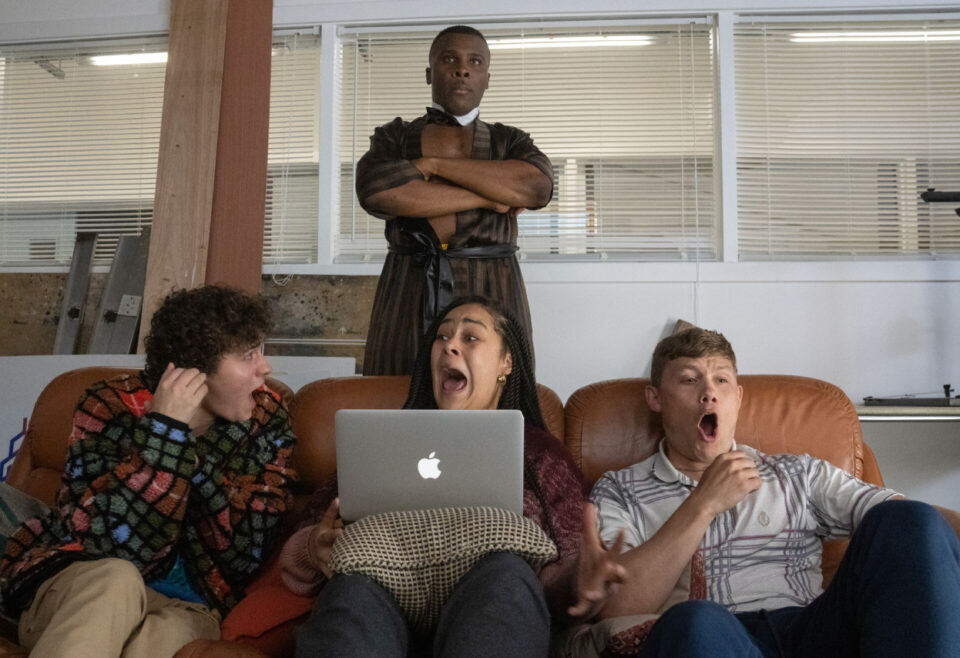
You need to plan something, that’s a big milestone.
Jon: That’s an exclusive.
Jack: Ten years and he’s still never snogged me. It’s mainly because I was friends with his wife first.
Jack: 2014 gave us Conchita Wurst, it gave us quite honestly one of my favourite Kylie [Minogue] albums of all time with Into the Blue. It gave us the ice bucket challenge. 2014 was the first time that I clocked RuPaul’s Drag Race. It was a big old gay year and I turned 21.
Jon: It was my big gay awakening, cause I met Sarah [Moore, his wife], completely changing my social life and started hanging around in gay clubs.
Jack: Jon has been to more gay bars than I have.
Jon: Yeah.
Jack: If you were to go and survey the country to find the UK’s biggest LGBTQ+ ally, it would be Jon. He knows more about queer culture than I do. I used to go to parties and I’d be like, ‘Who’s that?’ and Jon would be like, ‘That’s a drag king!’ His wedding was like a who’s who of RuPaul’s Drag Race finalists and semi finalists.
Big Boys, as its core, is a story of friendship that uses comedy to explore coming out and finding yourself. How do you strike the balance between humour and seriousness?
Jack: A lot of practice. The balance was something that I learned in live performance. I have done three Edinburgh shows and figured out how to layer jokes with true life stories. Also worked out what comedy can do, which can often knock down the awkward barriers of talking about painful stuff. Coming from a working class family, humour gets you through. I have been quite well versed in it so writing Big Boys, not to blow my own horn, comes quite naturally to me. My life has been having the incredibly painful next to the incredibly funny.
Jon, the first season explored your character’s mental health, and it was quite refreshing to see this in a straight male character. What can you tell us about his journey across this season?
Jon: Obviously, it doesn’t go away, it is still an on-going battle. Like Jack said, we get more context of Danny and his life before uni and how that has impacted him and why he is where he is. There is some amazing stuff in there, to act. He makes progress in realising this family around him is his chosen family, which is definitely the big theme of the show this year. It is something you hear a lot in queer communities. What was really special was that, in my own personal life, it is something that I have experienced. Not myself being a queer person necessarily, but being ingratiated into that community in a way that has made life much more interesting, fun, full of love and more accepting than I have been anywhere else in my life. More so than down the rugby club, anyway. There is a cultural exchange that needs to happen.
Jack: I’m going to tell the GAY TIMES that I went on a date with a gay rugby player and it was a huge achievement for me. I’m very proud of it.
Alison Hammond is rightfully showcased in the series and is also the name of your pet fish. Jack, do you know if Alison Hammond has watched Big Boys?
Jack: No we don’t know. I would find it incredibly weird if I were Alison Hammond to be presented as a fish in a programme of television. I am quite okay if she doesn’t want to engage in it. I think she is quite busy doing other bits and bobs. Oh my god, three days ago I got a DM and thought, ‘Why do I know the name Louie Spence?’ Louie Spence DM’d me like, ‘Thank you so much for the name drop in Big Boys’ and that was very sweet. My favourite story to tell, and I think I have told it twice today, is that Mel C really likes the show. There is a line about the Spice Girls choreography in the very final scene of season one and she was like, ‘I’ll teach you the choreography anytime you like.’
Jon: It was nice, for you especially, to have Big Boys come out and then within a month you were sending me videos of you and Rylan.
Jack: Rylan was like, ‘I need a part playing Danny’s boyfriend.’ It was funny. I think the highlight of my career has got to be when the show was on Celebrity Gogglebox, that felt like it really elevated it. It was such a huge celebration of the show and what Channel 4 has done for queer culture. I do think Channel 4 has the best receipts out of any other broadcaster for really taking risks on queer characters and writing stories.
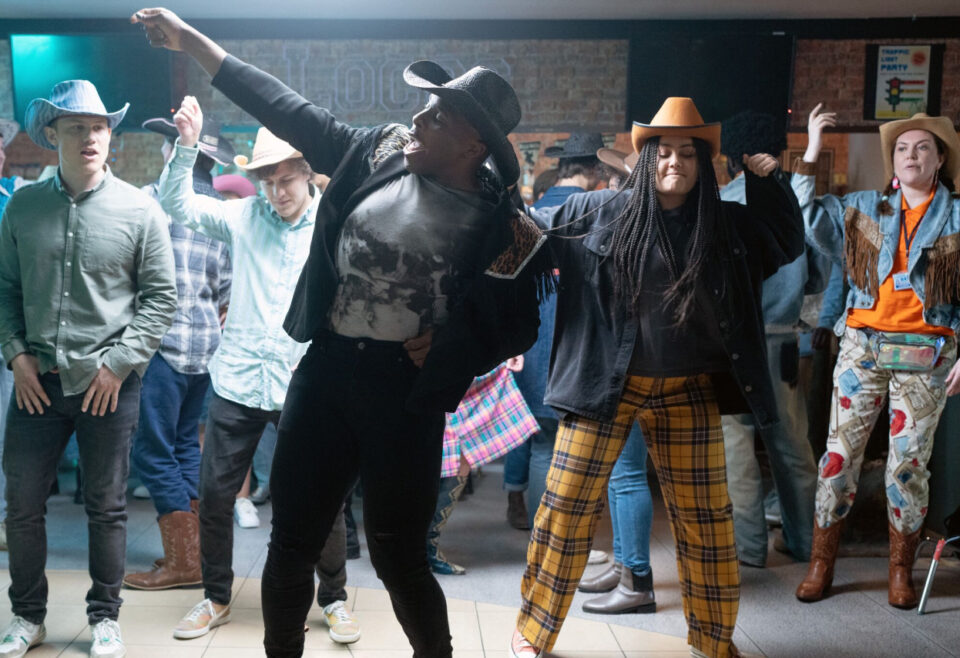
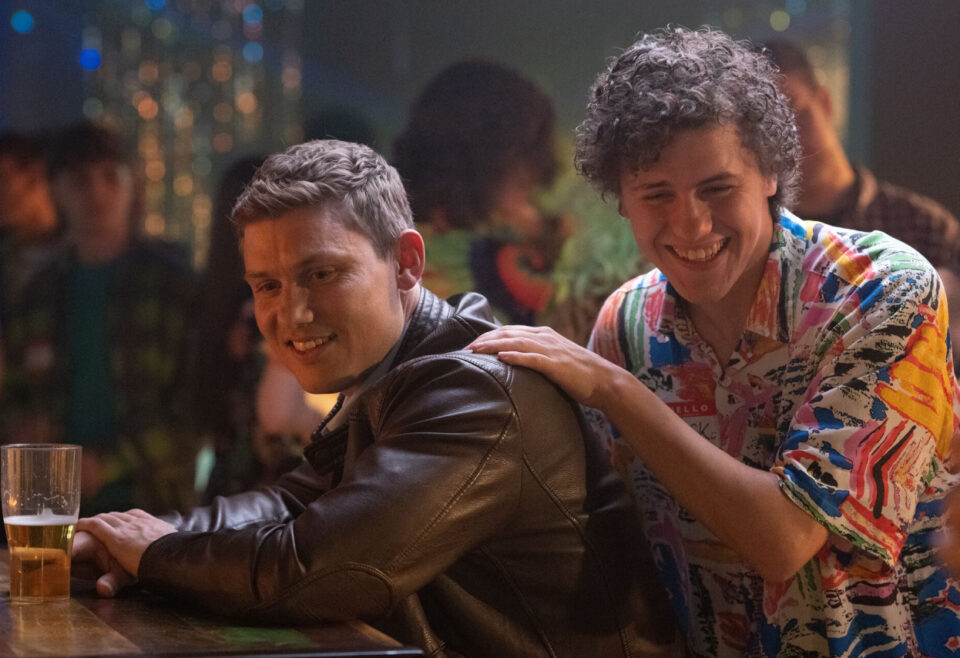
I don’t solely think of Big Boys as a gay comedy, but I think it is much bigger and much broader. I also know that a lot of its roots and support base is within my own community, so I am really chuffed for that. What is so nice is many queer audiences say their favourite character is Danny and yeah, that is because he is gorgeously handsome, but also because Jon has portrayed a very vulnerable straight character who we all know. It is way more likely that a queer person has a straight best friend than the other way around, just merely because of statistics. People have taken that character under their wing because Danny is the most important character I might ever write. It is so personal to me and is such a complex person. I do think a big part of Big Boys success is the acceptance that it is the straight white guy who is, almost at times, the most vulnerable. We can still accept that and love that and find space for that in the inclusivity that we all want to foster for everyone. I think that is really lovely.
How important is it for viewers, through TV and film, to see straight males such as Danny support LGBTQ+ people for who they are, and not continue to depict tired homophobic tropes?
Jon: I think it is hugely important. As Jack said, the response afterward shows this is clearly something that is commonplace but never really represented. One, it is a masterstroke from Jack, because it is a huge part of your life growing up, and the same for me. That was a huge part of my experience growing up.
Jack: It is also a huge part of our own relationship. I’ve got a video from 2016 in G-A-Y late. Do you remember?
Jon: Yeah.
Jack: We’ve been gay clubbing before and gone to so many weird odd nights where people have been doing the queerest, most alternative odd things going. So, it is just reflective of the truth. That is the thing that I am quite proud of with Big Boys. When I first started writing the show and pitching it to television commissioners there were so many bits, especially the queer tastes of it, that they just didn’t like. Gamu from The X Factor is too niche – who is going to get that pop culture reference? Is it really believable that a gay guy and this sort of straight guy would be best friends? It is believable because it is my own truth and I feel smuggly vindicated, because of how people have responded to it.
Jon, what is it like to play this role alongside Dylan?
Jon: When we shot the pilot, a year before we actually shot the show, it was the scene when Jack runs out of the uni. He has a terrible experience and is upset. I came and comforted him and I really tried to feel that for real, and I think ever since looking at Dylan in that moment I just wanted to look after him. It is through the script weirdly that I feel the way I do, not just about the two characters, but about Dylan. He is a sweetheart.
Lastly, over the past few years we’ve seen more and more productions with queer teenage protagonists, like Heartstopper, Saltburn, Sex Education etc. What do you think is so compelling to queer audiences about seeing LGBTQIA+ relationships play out in coming-of-age settings?
Jack: I think coming-of-age is often a time where people find a certain acceptance that is nice to see on screen, especially when there has been such a lack of it. We are getting to a place where there is a bit more of a broader exploration of that and the different types of characters. I still think we have a long way to go.
What do you think is missing?
Jack: I would like to see the one thing that is not in Big Boys, the fact I am a much larger, bigger person. Dylan is not. I still absolutely love Dylan playing Jack and it is a really brilliant depiction. He plays emotional facets of myself that I think are really important. If I asked you, ‘Alice, name me one fat gay sitcom character?’ you can’t because there really aren’t any. It is because TV commissioners have been really wimpy at allowing for there to be space for that. Everyone is still very attractive and very cute and very Instagrammable and that’s great but it still isn’t reflective of real life as it could be.
Where Big Boys differs from some other shows is that it has a working class perspective and representation that I really like. Generally, TV has got a long way to go and it needs to become a bit more broad spectrum of who we are allowing lead stuff. Everything is a step forward, everything is positive. Shows like Heartstopper? Positive. Shows like Sex Education? Positive. Shows like Big Boys are repairing a lot of lost representation over the last few years, but I still think there’s a long way to go.
Big Boys is streaming Sunday 14 January at 10pm on Channel 4.
Her reaction… #BigBoys returns for a second series from Sunday 14th January at 10pm on Channel 4. @jackrooke @Djllewellyn @JonPointing pic.twitter.com/3gCQ2XeUn4
— Channel 4 (@Channel4) January 8, 2024
